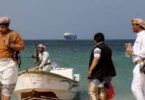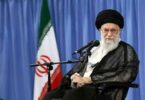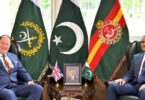WASHINGTON (AFP): British Prime Minister Boris Johnson and US President Joe Biden agreed in a call Monday that a “crucial window for diplomacy” remained over the crisis in Ukraine, Johnson’s office said.
The discussion, the latest among world leaders focused on the crisis in Ukraine, comes after US intelligence officials warned an invasion by Moscow into its western neighbour could be days away.
“They agreed there remained a crucial window for diplomacy and for Russia to step back from its threats towards Ukraine,” a Downing Street spokesman added of the call between the transatlantic allies.
“The leaders emphasised that any further incursion into Ukraine would result in a protracted crisis for Russia, with far reaching damage for both Russia and the world.”
They also stressed that diplomatic discussions with Russia remained “the first priority”, and welcomed talks that have already taken place between Russia and NATO allies, according to the spokesman.
“They agreed that Western allies must remain united in the face of Russian threats, including imposing a significant package of sanctions should Russian aggression escalate,” he added.
“They also reiterated the need for European countries to reduce their dependence on Russian gas, a move which, more than any other, would strike at the heart of Russia’s strategic interests.”
The White House said the two leaders “reviewed ongoing diplomatic and deterrence efforts in response to Russia’s continued military build-up on Ukraine’s borders and reaffirmed their support for Ukraine’s sovereignty and territorial integrity”.
“They discussed efforts to reinforce the defensive posture on NATO’s eastern flank and underlined the continued close coordination among Allies and partners, including on readiness to impose severe consequences on Russia should it choose further military escalation,” it added.
Russia has massed more than 100,000 troops nears its Ukrainian border and in neighbouring Belarus, where they have been doing joint exercises.
Earlier Monday, Johnson urged Russian President Vladimir Putin to step back from “the edge of a precipice”, calling the situation “very, very dangerous”.
The British leader said he had no plans to visit Moscow, but that he would be discussing the crisis with “various leaders” soon.
Meanwhile in London, Foreign Secretary Liz Truss later chaired a meeting of the government’s emergency “COBR” committee, to discuss British nationals who may end up stuck in Ukraine in the event of hostilities.
The government is urging all Britons to leave the country by commercial flights, but says it is maintaining a “core” diplomatic presence in Kyiv.
“We are doing everything possible to prevent a Russian invasion in Ukraine, while also preparing for the worst,” Truss tweeted after the meeting.
The prime minister was also to receive a security briefing from intelligence chiefs.
On Tuesday, he will chair a full meeting of the Civil Contingencies Committee that is convened to handle matters of national emergency or major disruption to discuss the UK’s overall response, Downing Street said.
Canada to send lethal weapons and loans
Canada is sending lethal military weaponry to Ukraine and loaning Kyiv Can$500 million to help defend itself in the face of Russian aggression, Prime Minister Justin Trudeau announced Monday.
“In light of the seriousness of the situation and following conversations with our Ukrainian partners, I’ve approved the provision of Can$7.8 million worth of lethal equipment and ammunition,” Trudeau told a news conference.
“This responds to Ukraine’s specific request, and is in addition to the non-lethal equipment we’ve already provided,” he said, adding that “the intent of this support from Canada and other partners is to deter further Russian aggression.”
In addition, the prime minister said Ottawa would provide more loans to Ukraine, bringing the total announced since the beginning of the year to Can$620 million (US$490 million).
Western allies have prepared what they warn would be a crippling package of economic sanctions in response to any attack, although Moscow has repeatedly said it has no such plans.
Recent Russian military exercises, including with Belarus, where the US said Moscow had dispatched 30,000 troops for more than a week of drills, have caused rising concern.
Canada, which is home to a large Ukrainian diaspora, has ordered its military trainers out of Ukraine and closed its embassy in Kyiv temporarily.
Some 200 Canadian soldiers have been deployed in Ukraine since 2015 as part of the UNIFIER mission, aimed at contributing to the training of Ukrainian forces.
German chancellor to meet Putin
German Chancellor Olaf Scholz was due in Moscow Tuesday in search of a diplomatic solution to avoid a war in Ukraine as the West and Russia signalled tentative hopes of an easing in the tense standoff.
His talks with Vladimir Putin are the latest in an intense diplomatic scramble to dissuade the Russian leader from attacking his ex-Soviet neighbour Ukraine.
Western leaders consider the Russian troop build-up on its border with Ukraine to be the worst threat to the continent’s security since the Cold War, and have prepared a crippling package of economic sanctions in response to any attack on its neighbour.
While Western intelligence officials warned Wednesday could mark the start of an invasion, comments from Putin and his foreign and defence ministers seemed to offer hope of a de-escalation.
During a carefully choreographed meeting Monday with Putin, Russian Foreign Minister Sergei Lavrov said “there is always a chance” of reaching an agreement with the West over Ukraine.
He told Putin that exchanges with leaders in European capitals and Washington showed enough of an opening for progress on Russia’s goals to be worth pursuing.
“I would suggest continuing,” Lavrov said in televised remarks, to which Putin replied — “fine”.
The Russian leader and his top aides have consistently argued that the current crisis is the result of the United States and western Europe ignoring Moscow’s legitimate security concerns.
Russia, which denies any plan to invade Ukraine, already controls the Crimea territory seized in 2014 and supports separatist forces controlling the Donbas region in the east.
The Kremlin insists NATO must give assurances Ukraine will never be admitted as a member and withdraw from eastern European countries already in the alliance, effectively carving Europe into spheres of influence. The United States and its European allies reject the demands.
– ‘Crucial window’ –
Washington said Russia had strengthened its forces on the Ukrainian border over the weekend but US officials insisted that “diplomacy continues to be viable”.
US President Joe Biden and British Prime Minister Boris Johnson agreed in a call late Monday that “a crucial window for diplomacy” remained.
“The leaders emphasised that any further incursion into Ukraine would result in a protracted crisis for Russia, with far-reaching damage for both Russia and the world,” a Downing Street spokesman said.
UN Secretary-General Antonio Guterres spoke with the foreign ministers of Russia and Ukraine on Monday to express his serious concern over the heightened tensions and insisted “there is no alternative to diplomacy”.
Russia has amassed more than 100,000 troops on the Ukrainian border but Pentagon spokesman John Kirby said US defence officials still did not believe Moscow had made a final decision on whether to invade.
Alarm has also been fuelled by recent Russian military exercises, including with Belarus, where Washington said Moscow had dispatched 30,000 troops for more than a week of drills.
Russian Defence Minister Sergei Shoigu told Putin that some of the drills were “ending” and more would end “in the near future”, signalling a possible easing of the crisis.
Ukrainian leader Volodymyr Zelensky meanwhile declared Wednesday — the day US officials warn might mark the start of a feared Russian invasion — national “Unity Day”.
– Digging trenches –
Ahead of his trip to Moscow, Scholz visited Kyiv on Monday, vowing that Berlin and its Western allies would maintain support for Ukraine’s security and independence and urging Russia to take up “offers of dialogue”.
Germany plays a central role in efforts to mediate in eastern Ukraine, where a gruelling conflict with Russian-backed separatists has claimed more than 14,000 lives.
But Berlin’s close business relations with Moscow and heavy reliance on Russian natural gas imports have been a source of lingering concern for Kyiv’s pro-Western leaders and Biden’s team.
Scholz has hedged against unequivocally backing Biden’s pledge to “bring an end” to Russia’s new Nord Stream 2 gas link to Germany.
While waiting for diplomacy to bear fruit, near the front line separating Kyiv-held territory from areas under the control of Moscow-backed insurgents in the east, underprivileged children in the care of church groups were helping with war preparations.
“We are digging trenches that Ukrainian soldiers could quickly jump into and defend in case the Russians attack,” Mykhailo Anopa, 15, told AFP.
In Moscow, Russians showed no appetite for war.
“People in the West do not understand that we are one people,” Pavel Kuleshov, a 65-year-old pensioner, told AFP, referring to Russians and Ukrainians. “Nobody wants a civil war.”
A growing number of Western countries are withdrawing staff from their Kyiv embassies and urging their citizens to leave Ukraine immediately, while Washington moved its mission west to Lviv.






